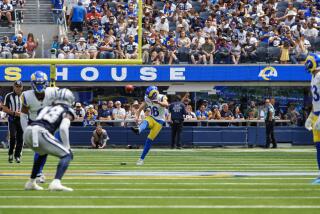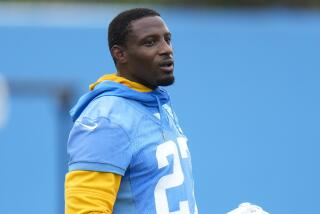Carter: 3 Carries, 1 Wrecked Knee : Pro football: Bengal running back, No. 1 pick in draft, is out for season.
- Share via
He dazzled the NFL with his potential, the Cincinnati Bengals with his marketability and the sports world with his $19.1-million contract.
But running back Ki-Jana Carter’s rookie season lasted only three carries.
Carter, the league’s No. 1 draft choice in April, suffered a torn anterior cruciate ligament in his left knee Thursday night and will not play again until 1996.
“This is probably one of the worst days of my life,” Carter said. “I’m deeply sorry.”
Carter, who left Penn State as a junior, becomes the first No. 1 pick since the first year of the combined NFL-AFL draft in 1967 to miss an entire season because of an injury.
He suffered the tear in the third carry of his first exhibition game, in Detroit. The play, called “Shoot 9,” was designed for Carter to run toward the left tackle and bounce outside.
But he never made it past left guard. Robert Porcher, a Lion defensive end, manhandled the Bengals’ Rich Graham and was waiting for Carter in the backfield.
Carter planted his left foot on the Silverdome carpet and tried to cut right. The foot caught in the rug and the knee was severely bent, even before Porcher smothered him.
“Ki-Jana’s one apprehension on draft day was that he didn’t want to play on artificial turf,” said Leigh Steinberg, Carter’s agent. “When I talked to him today, he told me that his knee had just gotten stuck in the carpet.”
Another preseason worry of Carter’s was whether he would survive behind the Bengals’ makeshift offensive line.
“[The doctor] said, ‘You’ve torn the ACL.’ I was like, ‘You’ve got to be kidding me,’ ” Carter said. “That’s like the worst thing you ever think of happening to somebody’s leg, tearing the ACL.”
Carter may also be the first player to be declared unable to play within a month of receiving a bonus check worth $7.1 million.
“We put our money down and we made the bet,” said Mike Brown, Bengal general manager. “Sometimes you win and sometimes you don’t.”
Carter will receive a second medical opinion in a couple of days, but he is expected to undergo surgery soon and spend the next six to nine months rehabilitating.
His rookie season ended with zero rushing yards on three carries in an exhibition game.
“I’d rank it up there high on a scale of 1-10, maybe close to the 10 number,” Brown said regarding the impact and disappointment caused by the injury. “But you’ve got to keep going. You can’t make something like this make you cry in your beer.”
The loss could effectively end whatever hopes the Bengals have of winning more than five games in one season for the first time in five years. An offense featuring the young talents of quarterback Jeff Blake and receivers Carl Pickens and Darnay Scott will have a running game led by . . . Eric Bieniemy? Or Harold Green?
Bieniemy and Green, the Bengals’ two running backs who will replace Carter, combined for 518 rushing yards and one touchdown last season.
Expect this incident to also lead to a renewal of the cry against artificial turf, which is used in half of the league’s 30 stadiums. Six of those are outdoor facilities.
Carter is the second NFL starter to suffer a season-ending injury because of artificial turf just this week. Earlier, the New York Giants lost guard Scott Davis because of a knee injury.
Although most studies show that the same percentage of injuries occur on grass, most agree that more serious injuries occur on turf.
“The only major advantage to turf is that it can look better on TV during bad weather,” said Steinberg, agent to many of the league’s top players. “Sooner or later, as critically important players are hurt, eventually there will be a serious cry for its elimination.”
Two other top picks since 1967 have missed what was supposed to be their first NFL season, but it was by choice.
Bo Jackson chose to play baseball instead of joining the Tampa Bay Buccaneers in 1986, and linebacker Tom Cousineau spurned the Buffalo Bills in 1979 to play in Canada.
More to Read
Go beyond the scoreboard
Get the latest on L.A.'s teams in the daily Sports Report newsletter.
You may occasionally receive promotional content from the Los Angeles Times.











